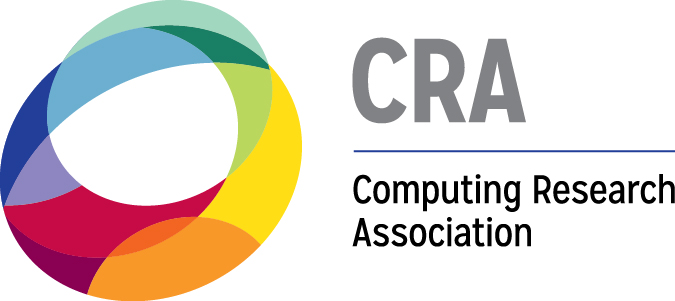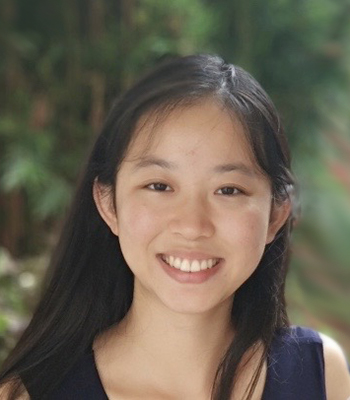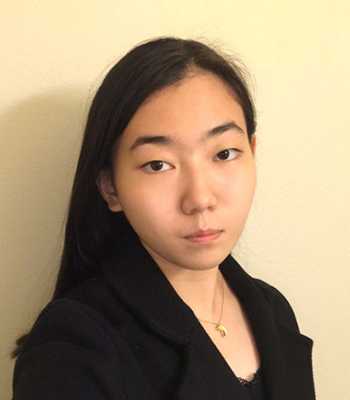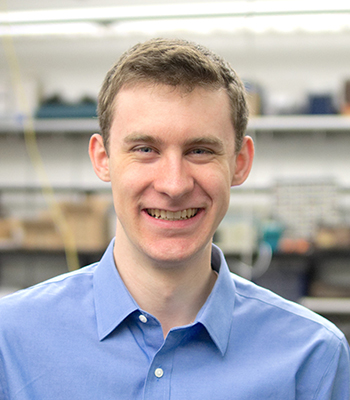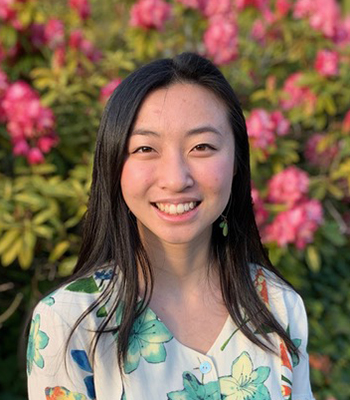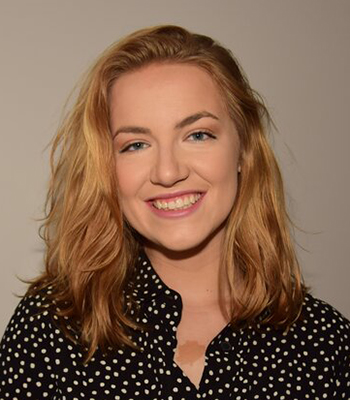Joy He-Yueya applies data science techniques to measures of patient behavior to assess how they might predict the onset of schizophrenia symptoms. Meanwhile, Ximing Lu uses machine learning to improve cancer diagnosis and explores how neural language models can advance commonsense reasoning. Parker Ruth builds mobile sensing systems to detect and monitor a variety of health conditions, while Jenny Liang develops programming techniques to support developer education and collaboration. And Emily Bascom contributes to research aimed at promoting user privacy and improving patient care.
For producing results with the potential for real-world impact, each of these University of Washington students — three nominated by the Allen School, two by the Information School — recently earned national recognition as part of the Computing Research Association’s 2021 Outstanding Undergraduate Researcher Awards. Each year, the CRA competition highlights a select group of undergraduates at universities and colleges across North America who are already advancing the field of computing and making an impact through their work. The achievements of the five outstanding student researchers honored in this year’s competition are a testament to UW’s commitment to undergraduate research; they are also proof that it’s never too early to begin using computing in the service of social good.
Joy He-Yueya (Awardee – Allen School)
CRA award recipient Joy He-Yueya is a senior majoring in computer science in the Allen School who has engaged in a variety of research projects related to health and education. Last year, He-Yueya began working with professor Tim Althoff, leader of the Allen School’s Behavioral Data Science Group, and UW Medicine faculty Benjamin Buck and Dror Ben-Zeev on a project seeking to mine the vast quantities of data generated by passively sensed measures of behavioral stability to support mental health. Their goal was to use data science techniques to understand the relationship between patients’ routines and the onset of schizophrenia symptoms. He-Yueya, who took the lead on data preparation, analysis and visualization as well as algorithmic development for the project, was first author of the paper describing the team’s findings that recently appeared in the journal npj Schizophrenia.
“What sets Joy apart as a student researcher is her independence to lead a research project herself and to collaborate with clinical researchers to connect innovations in computing and measurement to clinical goals,” said Althoff. “She was also very impressive at handling the complexity of a project that involved significant experimentation and seeing a project through from the first ideas to writing and to publication.”
He-Yueya recently contributed to a project at the Max Planck Institute for Software Systems in Saarbrücken, Germany that applies reinforcement learning to generate personalized curricula for students learning to code. She also has been working with researchers at Seattle-based Giving Tech Labs to develop methods for identifying relationships between voice and emotions and between voice and aging. In addition to her research, He-Yueya has served as a teaching assistant for the Allen School’s Introduction to Algorithms and Data Structures and Parallelism courses and has volunteered her time to a number of tutoring and peer mentoring roles — including leading workshops to help her fellow undergraduates get their own start in research.
He-Yueya’s entrée to academic research was working with iSchool professor Katie Davis in the Digital Youth Lab, where she focused on digital incentives for students to pursue science and engineering-related education. She earned a Mary Gates Research Scholarship from UW last year for her work. He-Yueya plans to pursue a Ph.D. following her graduation from the Allen School next spring.
Ximing Lu (Runner-up – Allen School)
Ximing Lu, who is majoring in computer science and statistics, was named a runner-up in the CRA competition for her work in machine learning and natural language processing. In less than three years, Lu has contributed to four major papers in submission — three of them as lead author. Her first foray into undergraduate research was working on a project with professor Linda Shapiro, who holds a joint appointment in the Allen School and Department of Electrical & Computer Engineering, that applies machine learning to improve the speed and accuracy of breast cancer diagnosis by reducing the uncertainty that stems from subjective human interpretation. The system they designed, Holistic ATtention Network (HATNet), is capable of learning representations from clinically relevant tissue structures without explicit supervision to classify gigapixel-sized biopsy images with the same level of accuracy as human pathologists.
Since last year, Lu has collaborated with Allen School professor Yejin Choi and colleagues in the Allen Institute for AI’s MOSAIC group on multiple projects seeking to advance the state of the art in natural language processing and visual commonsense reasoning. Among Lu’s contributions is TuBERT, a new multi-modal neural network capable of commonsense reasoning about the temporal relationship between visual events using a combination of YouTube video content and clues from their accompanying text narratives. Since its introduction, TuBERT has achieved state-of-the-art results on multiple commonsense reasoning tasks by outperforming substantially larger, commercially funded neural networks. Lu has also worked on Reflective Decoding, an approach for enabling pre-trained language models to complete paraphrasing and abductive text-infilling tasks without supervision, and the NeuroLogic decoding algorithm for controlling neural text generation models through logical constraints.
“Ximing is one of the most creative and innovatives undergraduate students I have had the pleasure to work with,” said Choi. “She has an impressive ability to rapidly synthesize new technical ideas based on seemingly disconnected pieces. Everyone in my lab has been eager to collaborate with her.”
Last fall, Lu received the Lisa Simonyi Prize honoring an Allen School student who exemplifies excellence, leadership and diversity. She was also named a Levinson Emerging Scholar by the UW in recognition of her accomplishments in research. After graduation, Lu plans to continue her studies next fall as a student in the Allen School’s fifth-year master’s program.
Parker Ruth (Finalist – Allen School)
Parker Ruth, a computer engineering and bioengineering major advised by professor Shwetak Patel in the Allen School’s UbiComp Lab, was named a finalist by CRA for his cross-disciplinary work on mobile health sensing technologies and computational tools for supporting population health. During his more than three years as an undergraduate researcher, Ruth has contributed to multiple projects aimed at enabling early identification and monitoring of symptoms and risk factors associated with a variety of medical conditions. His efforts have included the development of non-invasive, smartphone-based tools for measuring bone density to screen for osteoporosis, tracking cardiovascular disease through real-time measurement of pulse transit time, and detecting cough to facilitate diagnosis and monitoring of respiratory illness.
Most recently, Ruth has led the design of a smartphone-based exercise sensing system that employs ultrasonic sonar to measure physical activity as part of the Exercise Rx initiative in collaboration with The Sports Institute at UW Medicine. He is also developing algorithms to screen for risk of stroke by measuring blood flow in videos of the face. In addition, Ruth has contributed to the development of a wearable pulse sensing system for detecting a rare but serious cardiovascular condition known as postural orthostatic tachycardia syndrome. In response to the current pandemic, Ruth has worked on environmental sampling and viral detection protocols for screening air filtration systems in public transit and, in collaboration with bioengineering professor Barry Lutz, built image processing software that powers a smartphone-based tool for streamlining molecular assays for the virus in order to speed up diagnosis.
“Parker is advancing how we think about digital health and how commodity devices can play a role in democratizing health care and increasing access for everyone. He has demonstrated unprecedented work ethic, creativity, rigor, and an unique ability to present his work to a general audience,” said Patel. “He already shows the maturity of a graduate student and the capacity to define broad research agendas. On top of that, he is the most humble and selfless person you will ever meet.”
Ruth previously was named a Goldwater Scholar and recognized as a member of the Husky 100. He is a student in the University’s Interdisciplinary Honors Program and Lavin Entrepreneurship Honors Program and has been active in outreach to K-12 students, including helping to oversee the UbiComp Lab’s high school mentorship program.
Jenny Liang (Honorable Mention – iSchool)
Jenny Liang is well-known to the Allen School community, as she majors in both computer science and informatics. Her research spans software engineering, human-computer interaction, and applied machine learning. Liang earned an Honorable Mention from the CRA for her work with iSchool professor and Allen School adjunct professor Amy Ko in the Code & Cognition Lab.
Liang collaborated with Ko and partners at George Mason University on the development of HowTooDev, a searchable knowledge base of strategies for solving hard programming problems that has the potential to transform programmer productivity and reshape computer science education. Liang’s contributions to the project included the development and testing of multiple search-interface prototypes and a classification system for various programming activities. She combined the latter with semantic text search that leverages natural-language strategy notations to build the front and back end of a robust strategy search engine.
“Jenny is a force,” said Ko. “She is the kind of force that we don’t find often in academia — the kind that pushes the boundaries of our knowledge, and leads.”
Previously, Liang worked with postdoc Spencer Sevilla and professor Kurtis Heimerl in the Allen School’s Information and Communication Technology for Development (ICTD) Lab on the development of LTE-based community-owned networks to connect rural and developing communities to the internet. Liang co-authored a paper presenting the team’s solution, dubbed CoLTE, that appeared at the 25th International Conference on Mobile Computing and Networking (Mobicom 2019). The recipient of the 2020 Allen AI Outstanding Engineer Scholarship for Women and Underrepresented Minorities, since last summer Liang has been an intern with AI2’s MOSAIC team working on toxic language classification. She previously was honored with the Allen School’s Undergraduate Service Award and recognized as a member of the 2020 class of the Husky 100.
Emily Bascom (Honorable Mention – iSchool)
Informatics major Emily Bascom earned an Honorable Mention from CRA for her work on user privacy and information technology tools for improving patient outcomes. Bascom, who is pursuing a concentration in human-computer interaction, spent two years working with iSchool professor Alexis Hiniker in the User Empowerment Lab. There, she focused on a project examining the privacy risks associated with ubiquitous audio recording capabilities of smartphones, smart speakers, and other devices. Her contributions included helping to design the study protocol, leading design workshops with study participants, and analyzing data generated by design sessions and interviews.
“It was apparent throughout the project that Emily is a very talented scholar with an exciting career ahead of her,” said Hiniker, who is also an adjunct professor in the Allen School. “Her design insights and intellectual contributions far exceeded my expectations, and I can’t wait to see her translate those kinds of contributions into social change in the future.”
Bascom also collaborated with iSchool professor Wanda Pratt in the iMed research group on a project to understand how best to support patients and caregivers in acting as safeguards for hospital care — including improving communication between providers and patients to reduce medical errors. The researchers developed a tool, NURI, that enables patients and caregivers to record audio and semi-automatically transcribe their interactions with physicians and help them to understand the information they were given during those interactions. Bascom’s contributions included qualitative analysis of the user studies and preparation of the manuscript detailing the team’s findings and related work. She subsequently contributed to all aspects of a project led by Dr. Ari Pollack of UW Medicine and Seattle Children’s Hospital to develop tools to support pediatric kidney transplant patients, including protocol development, qualitative data analysis, and manuscript preparation.
Read more about Liang’s and Bascom’s work in a related iSchool story here.
Congratulations to these five exceptional researchers on their achievements!


